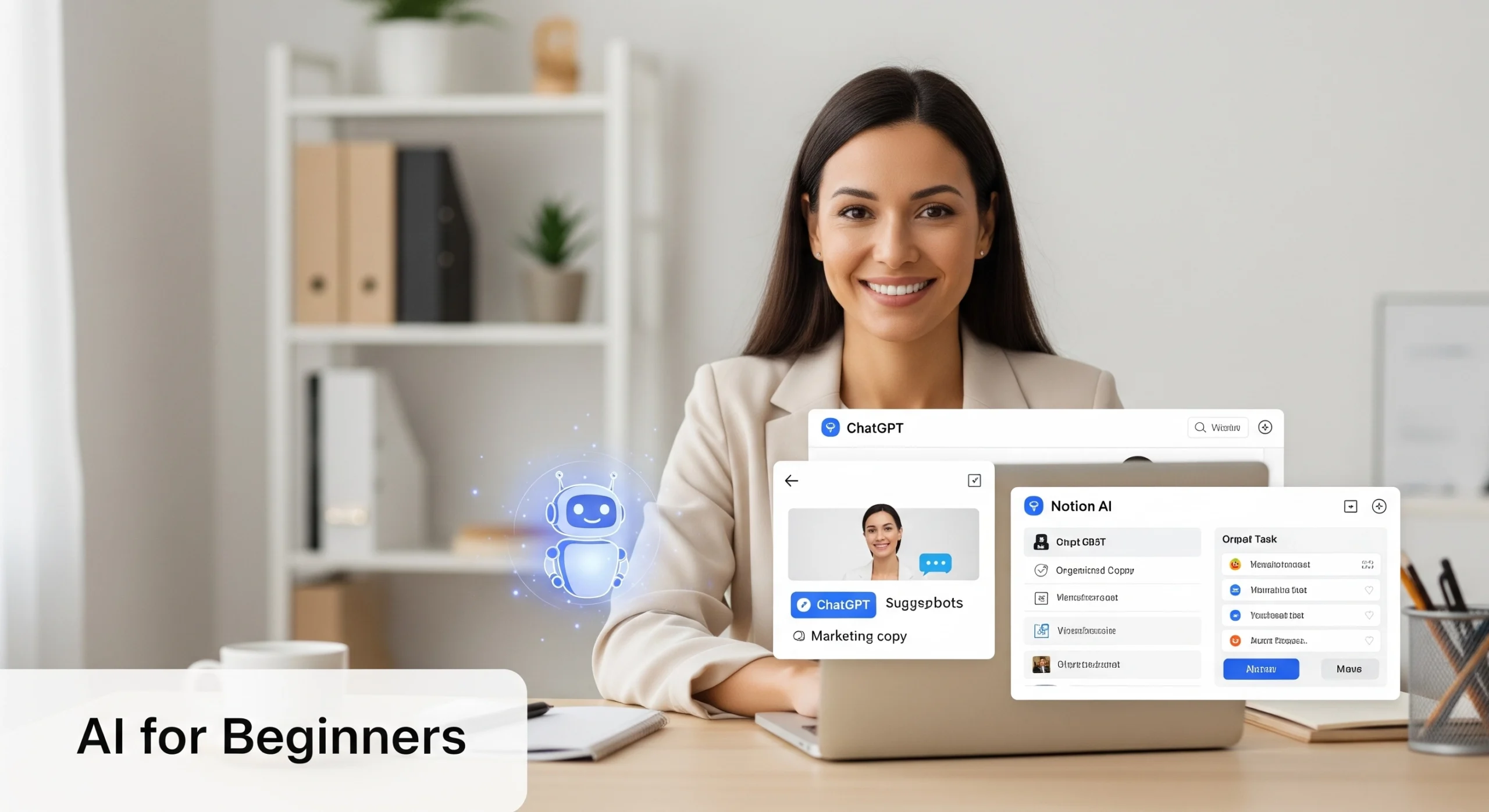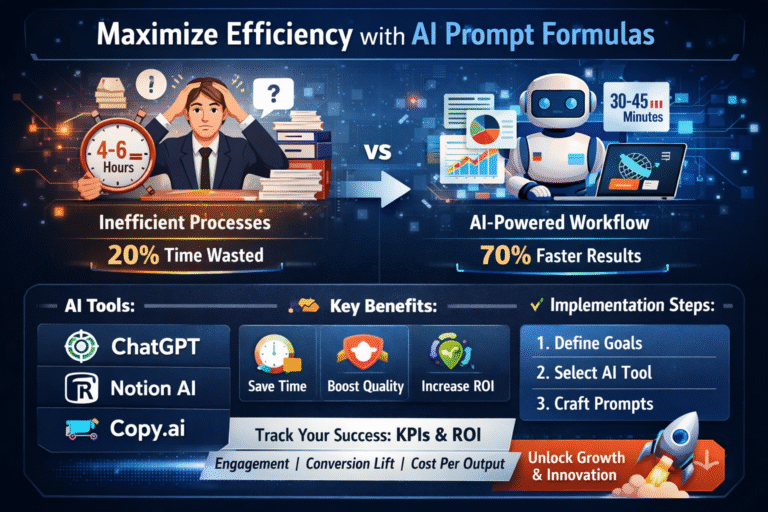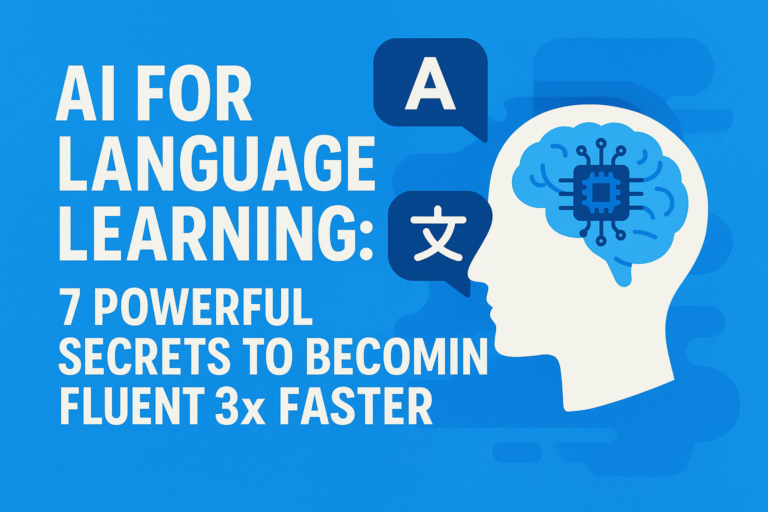Table of Contents
1. Introduction to AI for Beginners
In today’s hyper-competitive business landscape, staying ahead of the curve isn’t just an advantage—it’s a necessity. Yet, many marketing managers find themselves bogged down by repetitive tasks, struggling to keep up with customer demands, and facing rising operational costs.
The result? Diminishing returns and exhausted teams.
But what if there was a way to reclaim efficiency, save time, and drive growth—all with minimal technical expertise?
2. The Strategic Toolkit
As a business owner or marketing manager, you’re likely familiar with the challenges of manual processes. However, AI for beginners can provide a strategic advantage that’s within reach. Let’s break down the essential tools that form the foundation of a successful AI-driven strategy.
To start, consider these key elements:
- Understanding Your Audience: Before implementing any AI strategy, you must know your target audience’s needs, preferences, and pain points.
- Clear Business Goals: Define what you aim to achieve—whether it’s improving customer engagement, automating workflows, or enhancing content creation.
Now, here are some AI for beginners tools that can help you get started:
- ChatGPT: A powerful language model that can assist with content creation, customer service, and brainstorming. OpenAI ChatGPT
- Notion AI: Ideal for organizing tasks, drafting content, and analyzing data with AI automation. Notion
- Lensa AI: Perfect for creating engaging visuals for social media and marketing materials. Bing Image Creator
The key? Use these AI for beginners tools under the guidance of human expertise. Set clear instructions, review outputs, and refine strategies to align with your goals.
3. Time & Resource Investment
The time-consuming nature of traditional marketing tasks is no secret. But how much time can AI for beginners tools save your team? Let’s compare:
Manual Method: Crafting personalized email campaigns by hand for 5,000 subscribers might take 40 hours.
AI-Powered Method: Using AI tools like ChatGPT and Notion AI, you can generate and personalize content for the same audience in just 3 hours. That’s a 92.5% time reduction!
4. The Implementation Blueprint
Ready to dive in? Here’s a hands-on guide to implementing a basic AI for beginners strategy:
Step 1: Define your target segments based on demographics, behavior, or past interactions.
Step 2: Use an AI tool like Notion AI to draft personalized marketing messages.
Step 3: Leverage ChatGPT to optimize your email copy for tone and engagement.
Step 4: Test and iterate. Use A/B testing tools integrated with your AI platform to refine your campaigns.
Pro-Tip: Start small. Begin with internal processes, like document summarization or client communication, before scaling to larger campaigns.
5. Measuring Success: KPIs & ROI
To gauge the effectiveness of your AI for beginners strategy, track these key metrics:
| Metric | What It Tells You |
|---|---|
| Click-through Rate | Measures how well your campaigns resonate with your audience. |
| Lead Conversion Rate | Indicates how effectively your AI tools generate quality leads. |
| ROI | Determines the financial return from your AI-driven initiatives. |
| Time Saved | Reflects the efficiency gains in your daily operations. |
6. Scaling & Advanced Strategies
Once your basic strategy is in place, how can you scale? Consider these advanced AI for beginners approaches:
- AI-Powered Customer Service: Implement chatbots to handle routine queries, freeing up your team for complex issues.
- Predictive Analytics: Use AI to forecast trends and customer behavior, enabling proactive decision-making.
- Automated Content Generation: Expand your outreach by generating blog posts, social media updates, and more.
7. Strategic Business Applications
Here’s how different industries can leverage AI for beginners tools:
- B2B SaaS Companies: Use AI to segment leads and automate follow-ups, improving sales funnel efficiency.
- E-commerce Businesses: Enhance customer experience with AI-driven product recommendations and personalized offers.
- Digital Agencies: Streamline client projects with AI tools for reporting, brainstorming, and workflow optimization.
8. Common Strategic Pitfalls to Avoid
Even with AI for beginners, errors can occur if not addressed early. Avoid these pitfalls:
- Over-reliance on AI: Remember that AI is a tool, not a replacement for human judgment.
- Ignoring Data Privacy: Ensure compliance with regulations like GDPR when using customer data.
- Lack of Training: Equip your team with the skills to use AI effectively for better results.
9. Building Your Content Engine: Systems & Automation
Create sustainable growth by automating your AI strategy. Examples include:
- Automated Campaigns: Design workflows that trigger personalized messages based on user behavior.
- Content Pipelines: Use AI to generate drafts, which your team can refine before publishing.
10. Conclusion
AI for beginners is no longer a futuristic concept—it’s a practical tool that can revolutionize your business.
Share your experiences and challenges in the comments below.
Schedule a Call with our experts to explore how AI for beginners can work for your business! Schedule a Call
11. FAQs
Q1: Is AI for beginners complicated to set up?
A1: No! Many tools are designed with non-technical users in mind. Start with simple workflows and gradually expand.
Q2: What are some real-world benefits of AI for beginners?
A2: AI can streamline tasks, enhance creativity, and provide data-driven insights to boost decision-making.
Q3: How does introduction to AI differ from advanced AI?
A3: Introduction to AI provides foundational knowledge, making it perfect for those just starting their AI journey. Advanced AI dives deeper into complex models and applications.




